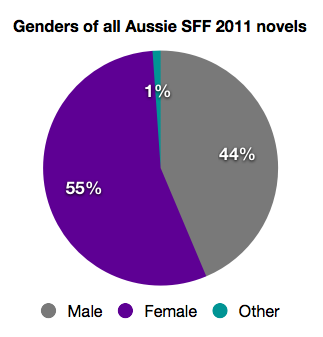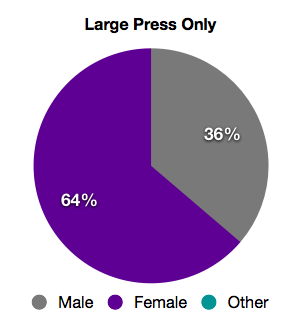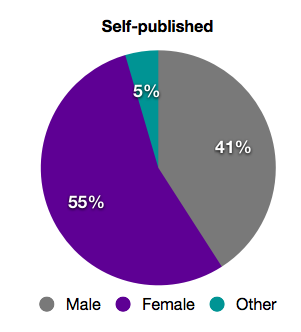Tansy put out a request on Twitter for someone to compile states on gender breakdown of Aussie SFF novelists and for some reason I volunteered. Because apparently I was bored this morning (actually, it did take my mind off feeling sick, so yay).
I used the Ditmar 2012 eligibility list which theoretically lists all newly published SFFH novels in 2011. It’s probably relevant to note that the list encompasses books intended for all ages and I didn’t really feel up to separating out children’s and YA from “adult” books, mainly because there are too many.
I allocated genders to authors I either already knew of or which had names I felt I could confidently assign a gender to. Those with initials or that I wasn’t sure about, I googled. There was only one author whose gender I wasn’t able to determine (Jamo Kane) because they don’t seem to have a website or bio anywhere obvious. There was also a writing team consisting of one man and one woman who were also lumped into the category of “other”.
This is the gender breakdown I got for all Ditmar eligible SFF novels. Note that if an author had multiple books published, they were counted multiple times. In the case of two authors of the same gender writing a book together, they were counted once for their gender.

Next I thought it would be interesting to see how that breakdown changes between types of publishers, so I allocated each work a type of publisher: large, small or self-published. This involved much googling of small presses and ambiguous self-publishing ventures so if you object to which category I’ve lumped a publisher into, please comment and I’ll change it.
Large Publishers included imprints of large publishers that might be less well known. I’ve indicated the parent company to clarify and included the imprint separately where the books were listed under the imprint. Large publishers:
- Allen & Unwin
- Carina Press (Harlequin)
- Dell (Random House)
- Feiwel & Friends (Macmillan)
- Hachette
- HarperCollins
- Headline (Hachette)
- Little, Brown
- Orbit (Little, Brown)
- Pan Macmillan
- Penguin Books
- Random House
- Scholastic

Small publishers vary in size and there were some I debated putting into the large category. Feel free to debate this. Also, university presses were automatically counted as small. (And I realised half-way that they’re in two chunks of alphabetic order and can’t be bothered fixing it, sorry.)
- Alto Books
- Angry Robot Books
- Australian Scholarly Publishing
- Brunette Publishing
- Clan Destine Press
- Eternal Press
- Hardie Grant Egmont
- MuseitUp Publishing
- Pantera Press
- Sandal Press
- Scribe Publications
- Text Publishing
- University of Queensland Press
- Walker Books Australia
- Warrambucca Books
- Winterbourne Publishing
- Another Sky Press
- ChiZine Publications
- Delirium Books
- Dragonfall Press
- Ford Street Publishing
- Fremantle Press
- Hybrid Publishers
- Iambik
- Jaffa Books
- Night Shade Books
- Severed Press
- Sleepers Publishing
- Tasmaniac Publications
- University of Queensland Press
- Vintage Books
- Walker Books Australia
- Winterbourne Publishing
- Wizards of the Coast
- Wombat Books.

Any book with a blank publisher field or with the author’s name repeated as the publisher was counted as self-published. The self-publishers that weren’t blank or author names are listed below. Again, if I misread something on a website and you want to argue about designation, please do in the comments.
- Xlibris
- Book Pal
- BookBaby
- CreateSpace
- Equilibrium Books
- Five Star
- Interactive Publications
- Jojo Publishing
- JustFiction Edition
- Lulu
- Omnium Gatherum
- Raider Publishing International
- Smashwords
- Thought Stream Creative Services
- Unicornkisses
- Vivid Publishing
- Writers Literary & Publishing Services
- Xlibris
- Zeus Publications

One final point I think it’s relevant to note: there are publishers in all three categories which aren’t based in Australia. All the authors have claim to Australianhood (which is what makes them eligible for Ditmars) but that’s not a restriction applied to publishers. Which means that this isn’t a look at the Australian publishing industry (although the majority of publishers seem to be Australian-based or have an Australian branch) but on Australian authors.
As for drawing any conclusions, I’ll leave that up to the rest of you.

No comments:
Post a Comment
Note: only a member of this blog may post a comment.